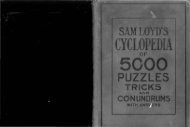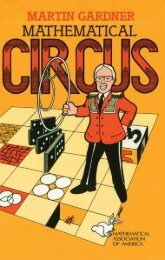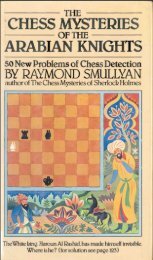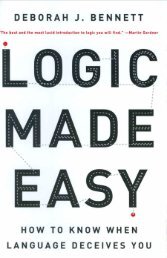Which Alice?
Which Alice?
Which Alice?
You also want an ePaper? Increase the reach of your titles
YUMPU automatically turns print PDFs into web optimized ePapers that Google loves.
ALICE IN PUZZLE-LAND<br />
"I'm really not quite sure," she replied. "Did he or didn't he?"<br />
"I'd says he didn't," replied the Gryphon, "only others say<br />
different, they does!"<br />
"Just what is their argument?" asked <strong>Alice</strong>.<br />
"They says that because George walked completely around the<br />
organ, and the monkey was on top of the organ the whole time,<br />
then George's path completely encircled the monkey, therefore<br />
George must have walked around him. But I says different—I says<br />
if George had walked around the monkey, he would have seen the<br />
monkey's back. Did he see the monkey's back? No! Therefore<br />
George couldn't have walked around him nohow!"<br />
"That's very interesting!" said <strong>Alice</strong>. "In a way I can see both<br />
points of view, and I'm not sure which one I find more convincing."<br />
"Well, here's another," said the Gryphon.<br />
"There was this here American dealer who sold used gadgets. A<br />
customer bought a used gadget from him for ten dollars. Soon after<br />
he bought it, the customer decided he didn't like it, so he sold it<br />
back to the dealer for eight dollars. Then comes along another<br />
customer and buys it from the dealer for nine dollars. How much<br />
profit did the dealer make?"<br />
<strong>Alice</strong> thought about this for a while.<br />
"Now, I gets three different answers from three different types of<br />
peoples," said the Gryphon, chuckling. "The first type tells me that<br />
the dealer made two dollars from the first customer, because he sold<br />
it to him for ten dollars and bought it back for eight dollars. But<br />
then having bought it back for eight dollars and having sold it to the<br />
second one for nine dollars, he makes another dollar. So altogether<br />
he makes three dollars on the deal.<br />
"The second type tells me that to begin with, the gadget is worth<br />
ten dollars. Then, like the first type, he says the dealer makes two<br />
dollars off the first customer. But he then sells a ten-dollar article to<br />
the second customer for only nine dollars, so he loses one of the two<br />
dollars he had gained. So his net gain is one dollar.<br />
"Then there's the third type, who, like the other two, tells me that<br />
the dealer made two dollars from the first customer. But when he<br />
sells the gadget to the second one for nine dollars, he has merely<br />
exchanged it for the nine dollars it is worth, so makes neither profit<br />
32
















